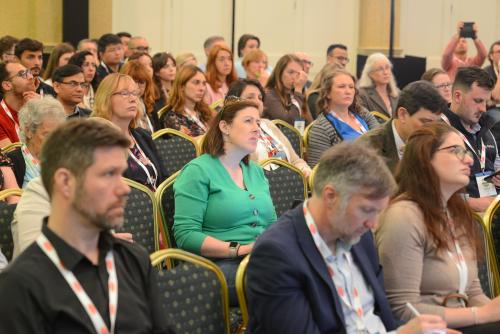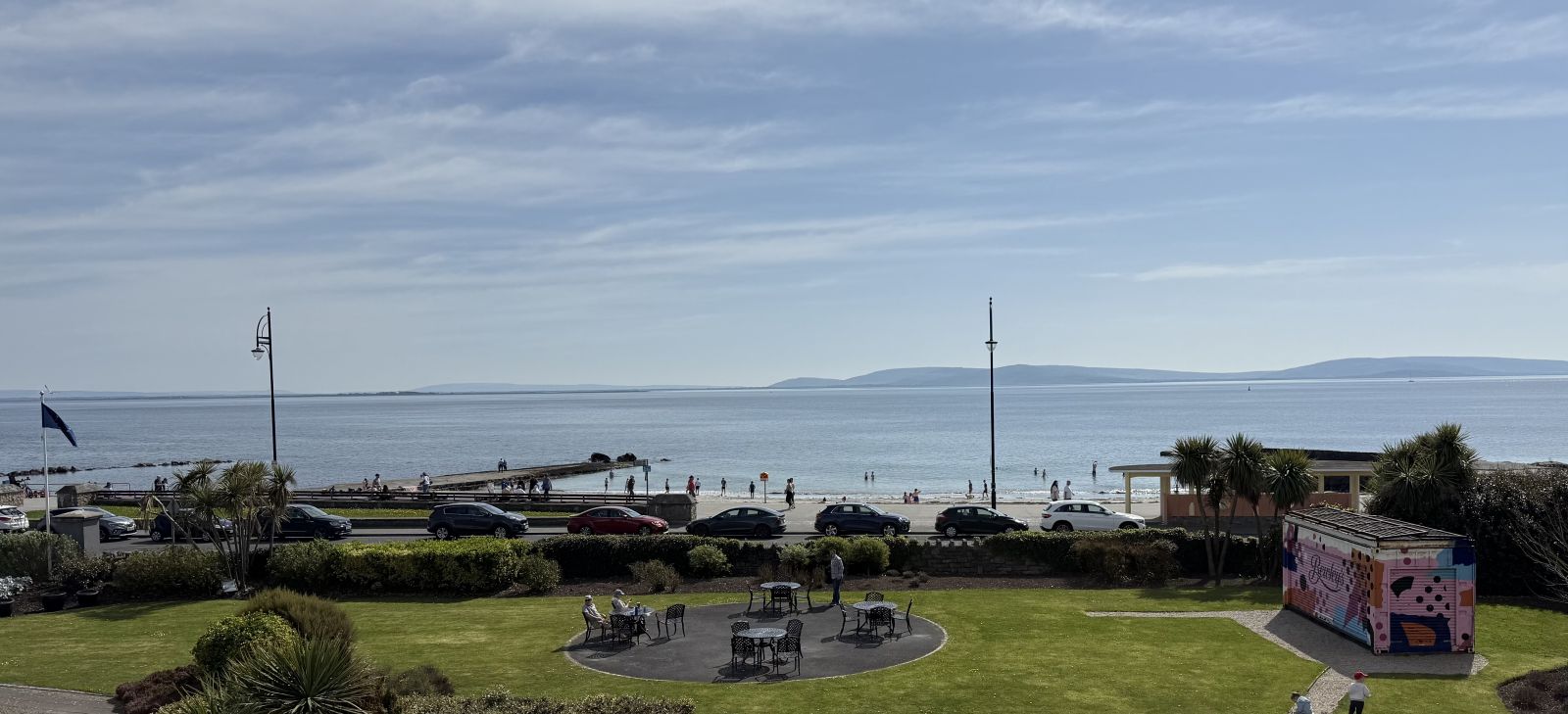
The British Society of Animal Science is a charitable organization, which has been in existence for over 80 years! It is also the principal learned body supporting animal science in the UK. BSAS works ‘to advance the sector, improve the understanding of all aspects of animal science and ensure research and knowledge transfer has a practical and beneficial application’. Its annual scientific conference regularly attracts delegates from across the world, this year was no exception, with approximately 400 delegates from 23 countries. The conference was held in sunny Galway on the stunning Wild Atlantic Way in the west of Ireland, from 8th-10th April.

Sunny Galway
In recent years, we have been given the opportunity to showcase the livestock research going on across the Scottish Government’s Strategic Research Portfolio (SRP), through organizing and hosting a SEFARI-sponsored session at the BSAS Conference. We have previously hosted sessions on topics ranging from ’Can we have our meat and eat it?’, ‘One Health’, ‘Reducing Greenhouse Gases from Animal Agriculture’, ‘Farming with Nature’ and ‘Sustainable Parasite Control in a Changing World’. This year’s topic was ‘Environmentally-Sustainable Livestock Farming’. You’ll note we had a similar session in 2023, but we all felt, it’s such a ‘live’ topic these days, with coverage in the farming press, TV and big events like Groundswell and GOFalkland, we thought we should revisit it again this year!
In the meantime, we at Moredun, under the auspices of SEFARI, have established an ‘Environmentally-Sustainable Livestock Farming’ (ELF) Working Group, drawing together researchers from across the SEFARI consortium, as well as industry experts and practicing farmers, to identify the key gaps in our knowledge and the researchable questions that could help address these.
We are currently active in this research area across the SEFARI collective, for example, the Climate-friendly Farming Initiative run by the James Hutton Institute at their Glensaugh farm; work on integrating environmental and biodiversity into hill farming and crofting ongoing at SRUC’s HMRC at Kirkton & Auchtertyre, and our own work at Moredun on rotational grazing at our Institute farm at Firth Mains – all do excellent tours, highly recommended, you can even do a virtual tour from your sofa!
We deliberately steered away from calling the group a ‘Regenerative Agriculture’ Working Group as ‘regenerative’ seems to be quite a contentious and divisive term! Aficionados describe the approach as a set of principles, rather than prescriptive practices and it’s about the journey, rather than the destination (Pasture for Life definition).
- Key principles include:
- Increasing biodiversity
- Reducing soil disturbance
- Maintaining soil cover
- Keeping living roots in the soil
- Integrating grazing animals into the farmed landscape
Just for balance, here’s a quote from a more conventional livestock farmer, ‘At the end of the day, we need to produce food, that’s the one thing we cannot do without (and should be any Government’s top priority) – research needs to support and enhance best practice on how that is achieved, while taking cognisance of the other pressures’, e.g. NetZero, Just Transition, Biodiversity targets, increasing production etc! So there’s a range of views as to what does/doesn’t constitute environmentally-sustainable livestock farming and how we go about promoting and supporting best practice!
We decided to run the session as a panel discussion this year, rather than a series of presentations, we felt delegates would see enough of those during the week! We were extremely fortunate to be able to assemble an impressive panel, drawn exclusively from the SEFARI ELF Working Group.
.png)
See some of the BSAS social media posts on X.
We also thought we’d be brave this year and try to capture the thoughts and expertise of the esteemed BSAS audience! After a bit of time for the Panel Discussion, we were able to pose a few key questions to the audience using the Mentimeter app on their phones, and view results on-screen in real time. This proved a very popular format, it really helped engage the audience and gave them an opportunity to contribute, it also provided us with a very useful output, selected screenshots below.
.jpg)
Are you a...


Key themes from the panel included recognising the central role of farmers in actually delivering public goods, and how we might better frame these discussions around sustainability in terms of resilience i.e. what can they do to make their farms more resilient, and how can we/science help? Also, giving farmers practical options, supported by evidence and research, rather than leading on policy goals and targets. There was also a good discussion around metrics (inc. livestock productivity, farm economics, biodiversity indices etc.) and how proxy measures may help us gauge and audit progress. There was also good engagement around animal health and welfare in environmentally-friendly livestock systems, identifying the win-wins e.g. silvopasture, a livestock management system of integrating trees and forage, where livestock can express their natural behaviour, but also being aware of potential unintended consequences e.g. increased disease risk, especially from vector-borne pathogens. There was a feeling, not sure it was a consensus, that policy alone won’t get us where we need to be. We need compelling narratives, peer-to-peer learning, and to give farmers options that work for them and their farms. Economics was a key consideration too, ultimately farms are businesses and any ELF system needs to be stand-alone profitable at the end of the day and resilient to all sorts of shocks including changes in climate, policy, consumer demands etc. Moreover, ELF is not just for livestock producers, it can also be a key part of cropping/arable operations, utilising by-products, adding value to rotations, enhancing soil carbon, nutrients and biodiversity. Finally, farms and the wider farming sector also need to be attractive options for the next generation of farmers to take on in the future.
In summary, we need to focus on practical, short-term resilience measures, we need to recognize diverse motivations among farmers, and we shouldn’t overload them with competing priorities. We also need to benchmark profitability and environmental impact to help guide behaviour change. We need more clarity and a strategic direction of travel in national policy frameworks, avoiding the often competing ‘policy soup’, as one audience member put it! We need to encourage peer-to-peer learning and integration of science with practice, relying less on ‘top-down’ policy and more on empowering farmers on the ground. Farmers need to know that the destination they are going will be profitable, that the actions they take will meet government requirements and that policy isn’t going to keep changing!
The audience were broadly in agreement with the panel. In answer to the question, ‘What’s the biggest missing link between academic research and actual on-farm decision making? Knowledge exchange/communication was the most common theme, with specific mention of stakeholder peer-peer learning and demonstration farms. There was also a call for practical steps and involving farmers in research to ensure outputs are practical and tailored to the needs of the end-user. The importance of acknowledging farming context in research was also highlighted, with respondents stressing a lack of understanding by scientists around farming business and practicalities. There was also a call for research to demonstrate the economic cost/benefit of ELF strategies and for policy regulations and/or incentives to be put in place.
We also asked, ‘If you could direct research funding toward ONE livestock sustainability topic, what would it be?’ Animal health and welfare was the most common response here, including disease surveillance and treatment, as well as animal nutrition and genetics. Research around ELF practices was a popular answer – silvopasture, circular systems, greenhouse gas mitigation, biodiversity and climate adaptation were all highlighted, as were financial resilience and farmers’ decision-making.
Finally, in response to, ‘What ONE key change would you like to see livestock farmers implement?’ Responses varied but most could be summarized into four themes viz. (i) animal health and productivity (ii) monitoring (iii) environmental practices and (iv) farm management/business. Improved productivity, animal genetics, health and welfare were also popular answers. Monitoring and record keeping was related to both animal performance and environmental indicators. Specific environmental practices mentioned were integrating trees and mixed swards into grazing land as well as use of virtual fencing and feed additives. Business and management suggestions focused on utilizing research outputs to move away from traditional practices and improved knowledge of costs of practices.
Key Cross-cutting Themes from the Panel and Audience
- Farmers as Key Contributors – Farmers play a crucial role in delivering public goods, balancing economic profitability with sustainability
- Resilient & Sustainable Farming – Sustainability should be framed through resilience, integrating environmentally-friendly systems that enhance animal health and welfare
- Evidence-Based Decision-Making – Practical farming options should be supported by research, bridging the gap between studies and on-farm decision-making
- Metrics & Priorities for Improvement – Productivity, biodiversity, farm economics, and financial resilience are vital areas for measurement and development
- Knowledge Sharing & Learning – Peer-to-peer learning and knowledge exchange are essential for implementing effective farming strategies
So, all in all, a really dynamic and insightful SEFARI session and an excellent week in Galway, both scientifically and socially, ‘great craic’, as they say! Huge thanks to our panelists, Davy, Fiona, Rob, Emily and Nigel, as well as SEFARI colleagues, Lynsey, Andrew and Kim Davie, RESAS Science Advisor for taking and sharing your excellent notes and helping with Mentimeter. Also, huge thanks to the BSAS audience for their contributions and the conference organisers for the invitation! As for immediate next steps, we will let the dust settle and distil down the key messages to take forward to our next ELF Group meeting, so watch this space for updates! Hopefully see you at BSAS 2026 in York!
Photo and Image Credit: Philip Skuce
.png)
.jpg)